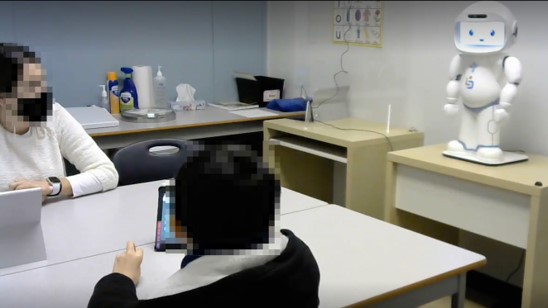Shruti Chandra

Bio
I am an Assistant Professor in the Department of Computer Science at the University of Northern British Columbia (UNBC) in Canada.
Prior to joining UNBC, I was a specially appointed assistant professor at the Tokyo Institute of Technology (Tokyo Tech) in Japan. I was a postdoctoral research fellow at the Social and Intelligent Robotics Research Lab (SIRRL) at the University of Waterloo in Canada. I hold a Joint PhD degree in Electrical and Computer Engineering from École Polytechnique Fédérale de Lausanne, Switzerland and Instituto Superior Técnico, Portugal.
Research Area
My research focuses on leveraging social robots to enhance people’s well-being, with a strong emphasis on practical and real-world applications. My work is deeply rooted in three essential domains: human-centred design, autonomous and interactive systems, and the dynamics of social interactions.
Pronouns: she/her
Services
Conference Program Committee
- 2024 Program Committee, Twelfth International Conference on Human-Agent Interaction (HAI 2024), Swansea, United Kingdom.
- 2023 Publicity Chair, International Conference on Social Robotics, Doha, Qatar.
- 2022 Session Chair, Advanced HRI capabilities for interacting with children, International Conference on Social Robotics, Florence, Italy.
- 2023 Jury Member, Robot Design Competition, International Conference on Social Robotics, Florence, Italy.
- 2022 Mentor, Atlantic Hackathon: Women in AI & Robotics Atlantic Hackathon, Waterloo, Canada.
- 2021 Lead Program Chair, Workshop at ACM/IEEE International Conference on Human-Robot Interaction (HRI): 16th annual Human-Robot Interaction Pioneers Workshop.
- 2021 Co-chair, International Conference on Robot and Human Interactive Communication (RO-MAN), Special Sessions & Video (Virtual).
- 2021 Co-chair, International Conference on Robot and Human Interactive Communication, Inclusion @ RO-MAN Committee, Inclusive HRI.Publicity Chair, International Conference on Social Robotics, Doha, Qatar.
Workshop Organization
- 2022 Co-organiser, Workshop at ACM/IEEE International Conference on Inclusive HRI II: Equity and Diversity in Design, Application, Methods, and Community, Hybrid.
- 2021 Co-organiser, Workshop at ACM/IEEE International Conference on Human-Robot Interaction (HRI): Yoga for Wellbeing: Classical Hatha Yoga Workshop, Sapporo, Japan (Virtual).
- 2021 Co-organiser, Workshop at Interaction Design and Children: Designing Games for and with Children. Co-design Methodologies for playful activities using AR/VR and Social Agent, Athens, Greece.
- 2020 Co-organiser, Workshop at Interaction Design and Children: Children, Robots, and Virtual Agents: Present and Future Challenges, Athens, Greece (Virtual).
- 2020 Co-organiser, Workshop at International Conference on Social Robotic: Child-robot Interaction: Present and Future Relationships, Golden, Colarado (Virtual).
- 2020 Co-organiser, Workshop at International Conference on Social Robotic: Child-robot Interaction: Present and Future Relationships (Golden, Colarado, Virtual).
Media Mentions
- 2023 Video, By KickStart Therapy, Humanoid A.I. Speech Therapy Robot: Collaboration – Kick Start Therapy & the University of Waterloo.
- 2023 Web print, By SPRINGWISE, ROBOTS HELPING CHILDREN WITH DISABILITIES STAY ON TRACK .
- 2023 Video, By Media Relations (Waterloo News), Robot helps students with learning
disabilities stay focused. There is ‘great potential for using robots in the public education system’. - 2022 Web print, By Folio, Social robots have the potential to supplement stuttering treatment.
- 2023 Web print, By University Relations (Waterloo News), Waterloo robotics expert partners with Learning Disabilities Society.
- 2022 Web print, By Neuroscience News, Social Robots Have Potential to Supplement Stuttering Treatment.
- 2021 Interview and Web print, By Cambridge Times Cambridge students say ‘bonjour’ to robot that might change the world.
- Web print, Learning Disability Society, The Learning Disabilities Society Partners with the University of Waterloo to Study the Benefits of Social Robot Interaction with Children with Learning Disabilities.
- 2019 Interview and Web print, By TechXplore, A social robot to enhance children’s handwriting skills.
- 2019 Web print, By GigaZine A robot that efficiently teaches children how to write letters is developed.
Research Projects

Adaptive, Personalised and Autonomous Social Robots Using Physiological Sensors
This project aims to develop adaptive and autonomous robotic systems integrated with a wearable heart-rate sensor to promote the physical, emotional, and psychological well-being of users in real-time.
Publications: 2023

Social Robots for People with Stuttering
This project sets a new research direction in the field of human-robot interaction to support people with stuttering. It aims to develop social robots to mitigate stereotypes about stuttering and help speech-language pathologists support their clients using social robots. Using the human-centred approach, a team of speech-language pathologists and HRI researchers is developing social robots to deploy them in clinical settings.
Collaboration: 1. Institute for Stuttering Treatment and Research, University of Alberta. 2. KidsAbility, Ontario
Publications: 2023, 2022, 2022

Social Robots to Aid with Speech Language Impairments
This project aims to develop social robots to support therapists and people with speech and language disorders. Using the human-centred approach, a team of speech-language pathologists and HRI researchers is developing social robots to deploy and assess at the therapy centre.
Collaboration: KickStart Therapy, Ontario

Social Robots to Aid with Learning Disabilities
Learning is more challenging for students with learning disabilities, and they can frequently display off-task behaviours to avoid attempting or completing challenging learning tasks. This project aims to explore the impact of integrating a socially assistive robot as an educational tool for instructors to provide redirection strategies to students.
Collaboration: Learning Disability Society, Vancouver, Canada
Publications: 2023, 2022

Social Robots for Fostering Intergenerational Relationships
This project lies at the intersection of game design and human-robot interaction, and aims to explore the roles of social robots in intergenerational gameplay. . By integrating a social robot into the gameplay, this research aims to bridge the communication gap between generations, facilitating not just collaboration but also enhancing the educational and recreational experience of participants across all ages.
Publications: 2020

Peoples' Perceptions towards Social Robots
This research aims to explore the attitudes of individuals across various professional sectors such as healthcare and educational centers regarding the implementation of social robots in their respective fields. By gathering public opinions on whether, how or when to utilise social robots, the research highlights the current needs, willingness and expectations of society towards these technologies.
Publications: 2024 (in review), 2023

Elevating HRI Methodologies
This research attempts to find the gaps in the existing HRI field and aims to advance, develop and expand the existing methodologies used in this field.
Publications: 2024 (in review), 2023

Co-Writer
Learning handwriting is a complex skill that has been associated with children’s learning and development. This project aims to develop a social robot that can help children in the acquisition of handwriting skills. It lies at the intersection of three research domains: education, pedagogic sciences and social human-robot interaction.
Collaboration: Different schools in Switzerland and Portugal.
Publications: 2015, 2016, 2017, 2018, 2019, 2020